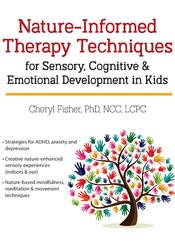

Epidemic proportions of children are diagnosed with ADHD, depression, sensory overload, and low self-esteem.
As therapists/educators, we are constantly looking for new tools and techniques that will truly make a difference in the overall health and well-being of children, while improving educational and therapeutic settings.
Outdoor play not only has the power to increase sensory regulation, attention, social skills, creativity, and problem-solving, but it’s free and readily available. Unfortunately, the average child spends less than 30 minutes playing in natural settings, and recess is the first activity to be omitted in time-constraints and used as a disciplinary consequence.
Today kids know more about engaging in gaming, tablets, and social media, than they do about climbing trees and spying on bird nests, planting seeds and watching plants grow, and interacting in the natural world.
Join psychotherapist, counselor-educator, author, and nature-lover, Dr. Cheryl Fisher to bring the benefits of nature-informed therapy and play into your clinical practice. The kids you work with will be:
This workshop will provide you with evidence-based practices in the area of nature-child direct engagement and overall wellness. Come explore a fresh, creative and innovative way to engage kids of all ages.
| File type | File name | Number of pages | |
|---|---|---|---|
| 052665 Manual (7.14 MB) | 57 Pages | Available after Purchase |

Cheryl Fisher, PhD, NCC, LCPC, ACS, is a licensed clinical professional counselor and counselor-educator with 30 years of clinical and educational experience with individuals, families and children. She is a certified trauma professional and an abuse and domestic violence specialist with extensive clinical experience working with trauma survivors of all ages. Dr. Fisher was awarded the Governor’s Award for her clinical work in trauma. She has deployed with the American Red Cross Mental Health Team both locally and nationally. Dr. Fisher is often assisted by her co-therapists, Max and Lily- golden doodle therapy dogs and a beta fish named Olive.
An international presenter, Dr. Fisher conducts research in the areas of nature and mental health, in addition to spirituality and meaning-construction. She is a columnist- The Counseling Connoisseur- for Counseling Today Online. Dr. Fisher has a PhD in Counselor Education and Supervision with an emphasis in the integration of psychology and spirituality, and an M.S. in Pastoral Counseling from Loyola University Maryland. She is certified in Jungian Sandtray work and play therapy. Dr. Fisher’s writing projects include Homegrown Psychotherapy: Nature-Informed Counseling and the Dr. Sophia children’s book series that connect children to nature in healing ways.
Speaker Disclosures:
Overview
NATURE-INFORMED TECHNIQUES FOR:
Cognitive, Emotional Development
Sensory Integration
Physical Development
CLINICAL APPLICATION:
Bring the Outdoors In
Venture Outside
Develop a Treatment Plan
Please wait ...